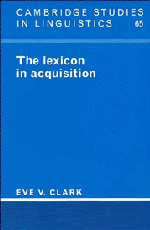Book contents
- Frontmatter
- Contents
- Acknowledgments
- 1 The lexicon: words old and new
- 1 LEXICAL ACQUISITION
- 2 CASE STUDIES OF LEXICAL INNOVATION
- 8 Words for things
- 9 More words for things
- 10 Words for agents and instruments
- 11 Words for actions
- 12 Words for undoing actions
- 3 CONCLUSION
- Bibliography
- Index of names
- Index of subjects
11 - Words for actions
Published online by Cambridge University Press: 05 July 2011
- Frontmatter
- Contents
- Acknowledgments
- 1 The lexicon: words old and new
- 1 LEXICAL ACQUISITION
- 2 CASE STUDIES OF LEXICAL INNOVATION
- 8 Words for things
- 9 More words for things
- 10 Words for agents and instruments
- 11 Words for actions
- 12 Words for undoing actions
- 3 CONCLUSION
- Bibliography
- Index of names
- Index of subjects
Summary
Young children don't only talk about things; they also talk about actions, and here too they coin new words. But where do new labels for actions come from? In many languages, perhaps most, the major source is nouns. Speakers can use the label for an object involved in the action to designate the activity itself, provided, of course, there is no established verb with just that meaning already available. In some languages, forming a new verb is also very simple, through zero-derivation; in others, the noun base requires an affix to mark its change of word class. Languages also differ in the extent to which such coining of verbs is productive: in some, it is highly productive, in others less so.
Factors like transparency, simplicity, and productivity should play the same roles in novel verb-formation as they do in noun formation, The extent to which this appears true is explored in the present chapter. I look first at innovative verbs produced in English and other Germanic languages, where noun into verb is generally productive, then turn to Romance and Slavic, and finally look at Hungarian and Hebrew. As before, I draw primarily from published records of longitudinal observations, supplemented by some cross-sectional studies of children's word formation. For English, these data are supplemented by my own observations of spontaneous and elicited forms. For the other languages, as before, I have drawn on published diaries, reports of vocabulary development, and the occasional elicitation study.
- Type
- Chapter
- Information
- The Lexicon in Acquisition , pp. 198 - 218Publisher: Cambridge University PressPrint publication year: 1993

